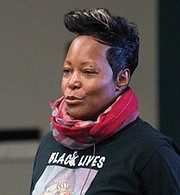Federal appeals court rejects VSU professor’s claim on pay discrimination
Jeremy M. Lazarus | 3/22/2019, 6 a.m.
Studies show that men make more money than women for doing the same work, but proving in court that gender bias is the reason a woman is receiving lower pay turns out to be very difficult.
That was the case for Dr. Zoe Spencer, a sociology professor at Virginia State University.
In a ruling Monday, an all-male, three-judge panel of the 4th U.S. Circuit of Appeals rejected Dr. Spencer’s claim that her gender is the reason that VSU paid her less than two male former administrators who were installed as professors in other departments at higher pay after losing their administrative posts.
Both men, Dr. Michael Shackleford and Dr. Cortez Dial, have since left the university. But while on the VSU faculty, each earned more than $100,000 per year as professors. That was more than $30,000 a year higher than the annual salary for Dr. Spencer, who based her suit on that disparity in pay.
Capping a three-year legal fight, the panel found that VSU had an adequate explanation for the pay difference that was gender neutral: That the two men were teaching in different departments, had duties that required them to do more work than Dr. Spencer and received pay based on their prior salaries as administrators, not their gender.
The case began in May 2016 when four female employees filed suits against VSU, alleging pay discrimination, sexual harassment and a pattern of retaliation against those who publicly objected to their situations.
Three of the women settled their cases, but Dr. Spencer refused to do so.
She appealed to the 4th Circuit after senior U.S. District Judge Henry E. Hudson found that the university had not violated the federal Equal Pay Act and dismissed the case.
Dr. Spencer urged the court to adopt a broad reading of the act and require the university to pay tenured faculty on an equal basis.
However, the panel shot down that approach.
In an opinion he authored for the panel, Judge Julius N. Richardson wrote that “this attempt comparison ultimately relies on the common title ‘professor’ plus some generalized responsibilities, for example, teaching students. …
“Professors are not interchangeable like widgets,” Judge Richardson continued. “Various considerations influence the hiring, promotion and compensation of different professorial jobs.
“As a result, faculty salary decisions require a complex balancing of factors. Among other things, those decisions account for the differences in skill and responsibility attendant to different jobs,” he stated.
“The university systematically pays engineering professors more than humanities professors. This reflects differences in skill along with market forces,” he wrote.
“This reality confirms that (Professor) Spencer’s broad generalizations about tasks and skills, which apply to virtually all teachers, fail to satisfy her burden to show equal work,” he stated in citing “equality as a demanding threshold requirement.”
The two other judges on the panel, Judge Henry F. Floyd and Judge J. Harvie Wilkinson III, agreed with the decision’s reasoning.








